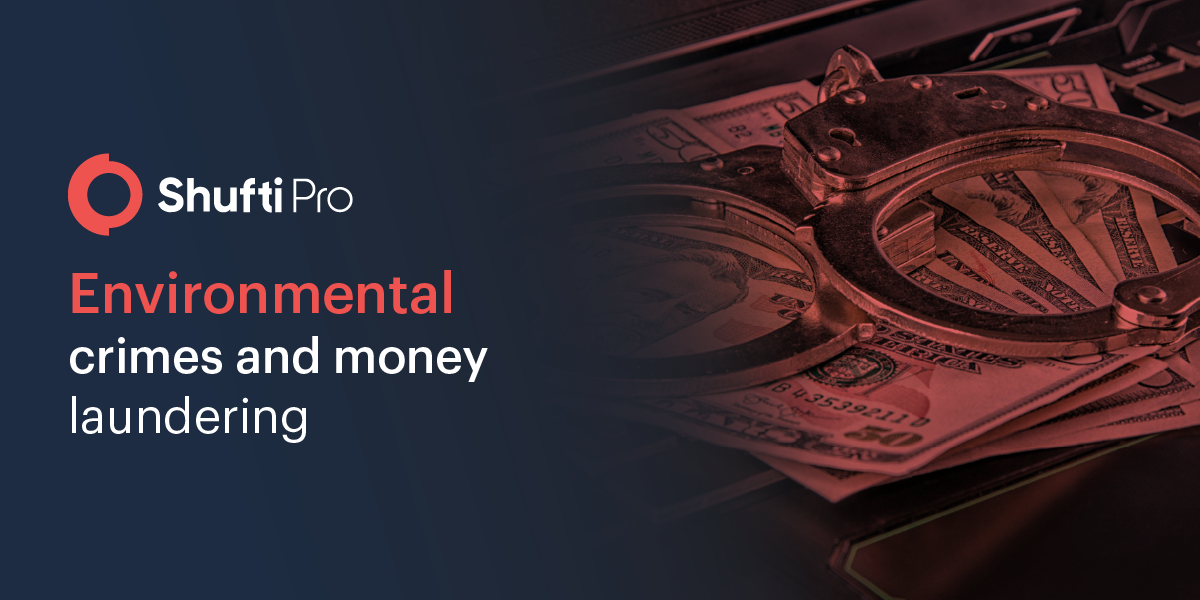The Reality Behind Money Laundering through Environmental Crimes

Environmental crimes are among the most prevailing and profiting offenses present in the world. Crimes such as forestry, illicit mining, waste trafficking, illegal oil theft and extraction, unauthorized fishing, and unlawful wildlife trading are environmental violations that are happening at a tremendous rate. These crimes, let alone generate around USD 91 billion to USD 281 billion every year. According to World Atlas, the golden triangle of Laos, Myanmar, and Thailand are the global hub for Illegal Wildlife Trading (IWT) and trafficking, whereas China is the largest importer.
Nations are prone to illegal financial flows because most of these countries lack proper knowledge or perhaps the will to handle the problem. States also know for a fact that only a few hundred dollar penalties are sanctioned regarding environmental offenses. Thus, even though FATF’s Recommendation 3 stated that countries are required to criminalize money laundering from a range of environmental crimes, very few are following the regulations.
What are 5 Major Environmental Crimes Leading to Money Laundering?
The five major environmental crimes are
- Illegal wildlife trading
- Smuggling ozone-depleting substances
- Illicit hazardous waste trading
- Unauthorized fishing
- Illegal logging and trading of stolen timber
These environmental crimes are prevailing due to consumption of illicit wildlife products, inefficient legal policy framework, and illegal financial flows.
How is Money Laundered through Environmental Crimes?
Illegal wildlife trading and other environmental crimes are a universal problem that needs widespread attention. These offenses are destroying nature and are a severe threat to earth. They lead to biodiversity loss, zoonotic diseases, climate change, and global warming. One million plant species are on the verge of extinction due to human activities, climate change has dispersed 12.5 million individuals, and the global warming rate has increased 1.5 degrees celsius.
Other than the loss of mother nature, there is a serious threat of money laundering through environmental crimes. Out of multiple ways that perpetrators use to launder money through environmental crimes, here are a few:
Unidentifiable Environmental Crime
The nature of environmental crimes makes it difficult to detect them. Criminals strategically place illegally obtained products (logs, stones, and waste) into the legal system without the authorities noticing them. The officials are unable to identify the illicit product mixing with the legally obtained products without cross-border coordination and lack of awareness. Hence, companies that buy these products have no idea that some of them were obtained illegally.
A real-life example of such an incident occurred in 2018 when an offender who ran a legal fish company used to mask his illegitimate pangolin trade income. As a result, the offender laundered USD 9 million through the trade.
Enforcement Challenges
Another complicating aspect of environmental crime is being able to identify the unlawful act. It is comparatively difficult to differentiate between the legal and illegal repetition of the uniquely same behavior. This is mainly because the framework of the environmental law relies upon previously sanctioned contracts and quotas. To put it another way, legitimate mining can quickly become felonious if an official is bribed; legal logging may convert to illegitimate logging once a quota has been filed. When hidden into the lawfully acquired products, these illegally obtained products are used to launder money by showing that they cost more than they originally are.
For instance, a policeman in 2017 illegally sold armadillos to buy expensive cars, clothes, and accessories. Then, after being arrested, he tried his best to hide his possessions by creating fake invoices.
Trade-Based Money Laundering
The dealing of heavy raw materials and goods makes it effortlessly easy to indulge in Trade-Based Money Laundering (TBML). TBML makes it easy to over and under invoice the shipping of goods by mislabelling the hazardous waste or concealing the real value of the protected wood. The goal of TBML is to launder illegally obtained products into the international trade system. Profiting from illicit trading is the best way to launder money because of the deficiency in monitoring the financial flows of these products. This makes it evident that countries seldomly focus on the financial perspective of this crime; hence, criminals expand their illicit activities into this area.
Escaping The Banking System
Criminals are tactically escaping the well-regulated banking system by opting for cash, social media platforms, prepaid cards, gift cards, or mobile applications. These offenders sell the products through different payment channels for years after exchanging pictures through social media platforms. They receive the finances before shipment and use the ordinary post service that already has ineffective regulation compliance. The products that are usually laundered are medicinal herbs that are costly in the market due to their nature, such as scorpion venom or elephant ivory.
Use of Front & Shell Companies
Legal source funds are mixed with illegal funds to launder them easily. Multiple front companies already deal in natural resources hence have the benefit of the doubt to conceal illegal products and funds strategically. For instance, in 2015, the Singaporean Authority busted an unusual shipment from Africa into Asia that was originally shown as teabag exports. The criminals had stashed the bags with ivory and other animal parts underneath the tea bags. All the dealings occurred through a front company to justify the financial flows.
There are shell companies that are registered as a “waste management company” or any other environmental industry to launder money successfully. For example, launderers hide their money by showing that they bought resources from these industries, whereas in reality, such is not the case.
Regulatory Stance On Money Laundering through Environmental Crimes
The FATF’s report on “Money Laundering From Environmental Crimes” highlights the need for regulatory authorities to solve the money laundering problems generated from environmental crimes. The illegal wildlife trade, illicit logging, and numerous offenses make it essentially important for financial institutions to initiate investigations within the public and private sectors.
The “FinCEN’s Calls Attention to Environmental Crimes and Related Financial Activity” on Nov 18, 2021, highlights instructions for financial institutions to file SARs when detecting environmental crimes.
Both the regulatory authorities have stated instructions for financial institutions to take IWT and other environmental crimes seriously. It is not just an economic offense but also damages to our prestigious environment. The future obligations may become harsher for institutions that do not pay attention to detail regarding environmental crimes related to financial flows.
What can Financial Institutions do for Enhanced AML Compliance?
The foremost concern for businesses is to recognize IWT and other environmental crimes as financial crimes. Moreover, creating an AML policy is equally necessary to combat rising environment-related crime risks.
Other than the aforementioned solutions, financial institutions must incorporate robust AML verification solutions that can indicate red flags related to environmental crimes. Any person related to the environment or wildlife-related activities must go through stringent AML checks. When onboarding, zookeepers, breeders, herbal companies, international traders associated with the environmental industry must undergo proper screening.
Do you want to know more about AML screening for environmental crimes?

 Explore Now
Explore Now














